Chinese officials are highlighting the launch of the first of a new generation of highly energy-efficient inland cargo ships. The vessels feature a standardized design for mass production and will be the leaders in the modernization of China’s inland operations.
The two ships were launched on August 22 at the Shandong Xinneng Shipbuilding Company. One is 295 feet (90 meters) in length and fueled with LNG for container transport. The second vessel is 222 feet (67.6 meters) in length and uses a hybrid electric drive to transport general cargo. Among the innovations being promoted is that they were able to increase container capacity from 70 to 161 boxes. They also feature a fuel-efficient design.
Among the technologies employed are inland power packs for electric power as well as a gas-electric hybrid power system. The hull is low resistance. They predict the ships will have about six percent lower resistance which will produce at least a three percent energy savings. The deadweight of the vessels is five percent lower than older ships and through the use of LNG and batteries, emissions will be lowered by 90 percent. Carbon emissions with lowered by 15 percent.
The ships will become the largest new energy intelligence shipping on the Beijing-Hangzhou canal. Officials point out that there are more than 10,000 ships operating on the inland rivers in China. Most of the ships they said are generally more than 10 to 15 years old and lack standardized designs. They also have higher emissions and lack fuel efficiency.
The new ships they predict will be the first of a batch of new energy intelligence shipping for the inland industry. A key feature is that the design has been standardized for ease of production. Xinneng reports it has four standardized designs. In addition to the 90-meter LNG-fueled containership and smaller multi-purpose vessel, they are proposing a 67.6-meter fully battery-powered multi-purpose ship and a 57.8-meter (189-foot) LNG-fueled ship.
Using the standardized designs, the shipyard says will save costs and time in production and also make the ships more efficient to operate. Xinneng Shipbuilding predicts it can each year build 400 ships, each in a range of 1,000 to 2,000 tons for inland shipping.
Reference : China Launches New Generation of Energy-Efficient Inland Cargo Ships (maritime-executive.com)

